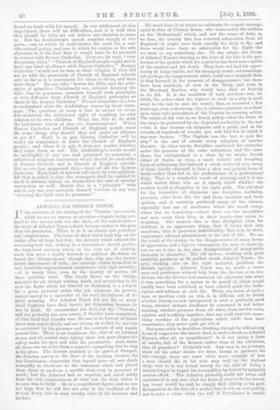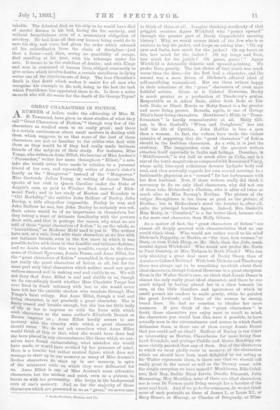ADMIRAL SIR GEORGE TRYON.
TF the accounts of the sinking of the 'Victoria' are correct, which we see no reason to question—dispute being con- Suad to the causes, and not the facts, of the catastrophe— he story of Admiral Tryon's death belongs rather to the poet ihau the journalist. There is in it an almost epic grandeur and completeness. The sense of duty which kept him on the bridge after all hope had fled ; the chivalry which refused the swimming-belt lest, lacking it, a subordinate should perish ; the high-bred courtesy which, in the very act of sinking, made him wave a kindly farewell to Admiral Markham on board the Camperdown,' though that ship was the uncon- scious instrument of ruin ; the courage which, from first to lust, faced the unprecedented misfortune with high serenity ; —it is rarely that, even in the history of navies, all these qualities meet. The lonely figure on the bridge, entchful for all, though waiting death, and permitting to his erew the flight which for himself he disdained, is a subject tor a great pictorial artist, who yet, whatever his powers, e,„aunot convey to a spectator of his work the fullness of its great meaning. For Admiral Tryon did not die as many naval Captains have died, heroic, yet despairing because he was in fault. He commanded the fleet, not the 'Victoria,' and was probably not even aware, if blunder were committed, of what kind that blunder was. He was in no fervour of battle when men expect death, and are strung up to face it; nor was he sustained by the presence and the example of any equals around him. There is no loneliness like that of an Admiral at BM and all around were taking their last poor chance for safety under his eyes and with his permission. And, above all, there was no order from a superior compelling him to stop in his place. The Roman sentinel at the gates of Pompeii, the Russian sentry at the door of the burning theatre, the bey Casabianca—supposing that legend true—all met death tranquilly in obedience to the command which had placed them there to perform a specific duty even in presence of death ; but the Admiral had no superior, and acted solely from his own consciousness of what was the duty which it became him to fulfil. He is a magnificent figure, and we can but hope that he will live not only in the tradition of the British Navy, but in song worthy alike of his heroism and Isis fate. We must leave it to others to celebrate the superb courage, equal to that of Colonel Seton, who commanded the soldiers on the 'Birkenhead,' which, and not his sense of duty, is, we fear, the quality that has extorted admiration from all England—it might have been equally his duty to fly, and there would have been no admiration for the flight—for we want to say something else. To our minds, the charm of Admiral Tryon's bearing in the hour of his fate is the per- fection of the system which for centuries has bred men capable of his conduct and his death. They have not had his oppor- tunity of being visible, not his strangely scenic surroundings, not perhaps the temperament which could have inspired them to that farewell in the moment of disappearance; but there have been hundreds of men in the Navy, and even in the Merchant Service, who would have died as bravely as he did. It is the tradition of both services—not, we think, the order—that the highest in rank on a ship in peril must be the last to quit the vessel; that, as occurred a few years ago, even a stowaway, who is almost a criminal in sailors' eyes, must take precedence of the Captain in securing safety. The origin of the rule is, we fancy, policy—that the State or the owner be protected by the Captain's authority to the last —but it has become an etiquette and a pride, and in the records of hundreds of wrecks, you will find few in which it was ever broken. "The Captain was the last to quit the ship" is the end of almost every telegram of marine disaster. In other words, discipline continued for centuries under the pressure of the same necessities and the same ideas, has extinguished in a class by no means devoid either of faults or vices, a most natural and tempting form of selfishness, has induced a whole serieslof men, many of them hardly educated, to face a slow and painful form of death rather than fail in the performance of a professional duty. That is a wonderful result of training, and it is one which makes those who see it clearly doubt whether the modern world is altogether in the right path. The old ideal for the formation of character was discipline, hardship, pressure, alike from the law and from teachers and from opinion, and it certainly produced many of the virtues, especially that one of obedience which the world every- where but on board-ship—where there are few unrealities and men carry their lives in their hands—has taken to despising. The modern idea is that discipline, even for children, is an oppressive thing, that it turns men into machines, that it quenches individuality, that it is, in short, unpleasant, whereas pleasantness is the end of life. We see the result of the change in the disappearance of many forms of oppression, and a lighter atmosphere for men to move in, but we see it also in the slow disappearance of many noble elements in character. The old system, working with good material, produces as its perfect result Admiral Tryon ; the new, working also on the right material, produces the British agitator. Admiral Tryon was no doubt a brave man and gentleman without help from the Service or it tra- ditions, but the Service had annealed his character into what it was, something for a nation to be proud of, which would hardly have been exhibited or have existed amid the indis- cipline and softness of civil life. When one hears of such a man so meeting such an end, it is difficult not to doubt whether liberty as now interpreted is such a perfectly good thing, whether instant obedience to command is not better training, whether pressure from all sides, from service rules, opinion, and hardship together, does not weld men into some- thing worthier of the aspirations which, while men have consciences, they never quite get rid of.
But some critic is doubtless thinking, though he will not say it out of respect for the heroic dead, is such a death as Admiral Tryon's, after all, so magnificent? Is it not rather a form of suicide, full of the Roman, rather than of the Christian, idea of grandeur? Certainly not. Any man is, we presume, when all his other duties are done, bound to preserve his life—though there are cases when mere example of how a man should die at his post may well be the highest duty—but he is not bound merely for the sake of living a minute longer to impair his tranquillity by fuss or by palpably useless effort. The Admiral probably could not swim, and understood in any case what the force of suction in the drown- ing vessel would be, and he simply died quietly at his post. Resignation in the face of a settled fate is not an evil quality, nor is calm a crime when the will of Providence is unmis- takable. The Admiral died on his ship as he would have died of mortal disease in his bed, facing the foe serenely, and without forgetfulness even of a momentary obligation of courtesy. He had done all that any human being could do to save his ship and crew, had given the order which released all hie subordinates from the chain of discipline—just then a fetter—and, then, seeing no possibility of escape, died standing at his post, with his telescope under his arm. It seems to us the stateliest of deaths; and with Kings and men in command of human lives, obliged constantly to give orders which involve deaths, a certain stateliness in dying seems one of the requirements of duty. The true Christian's death is that death which makes it easier for all men who recognise his example to die well, doing to the last the task which Providenoe has appointed them to do. Is there a sailor on earth who will die worse for the death of Sir George Tryon?











































 Previous page
Previous page